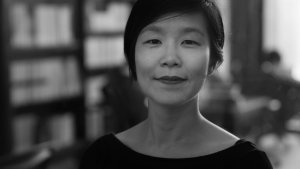Presented By: Nam Center for Korean Studies
Nam Center Colloquium Series | The Korean War through the Prism of the Interrogation Room
Monica Kim, Assistant Professor, History, University of Wisconsin; William Appleman Williams & David G. and Marion S. Meissner Chair in U.S. International and Diplomatic History

Please note: This session will be held virtually EST through Zoom. This webinar is free and open to the public, but registration is required. Once you've registered the joining information will be sent to your email.
Register at:
https://myumi.ch/pdWPE
Through the interrogation rooms of the Korean War, this talk demonstrates how the individual human subject became both the terrain and the jus ad bellum for this critical U.S. war of ‘intervention’ in postcolonial Korea. In 1952, with the US introduction of voluntary POW repatriation proposal at Panmunjom, the interrogation room and the POW became a flashpoint for an international controversy ultimately about postcolonial sovereignty and political recognition.
The ambitions of empire, revolution and non-alignment converged upon this intimate encounter of military warfare: the interrogator and the interrogated prisoner of war. Which state could supposedly reinvent the most intimate power relation between the colonizer and the colonized, to transform the relationship between the state and subject into one of liberation, democracy or freedom? Tracing two generations of people across the Pacific as they navigate multiple kinds of interrogation from the 1940s and 1950s, this talk lay outs a landscape of interrogation – a dense network of violence, bureaucracy, and migration – that breaks apart the usual temporal bounds of the Korean War as a discrete event.
Monica Kim is a historian of the United States and international and diplomatic history. In her research and teaching, she focuses on three issues that have centrally informed the position of the United States vis-à-vis the decolonizing world during the twentieth century and beyond: the relationships between liberalism and racial formations, global militarism and sovereignty, and transnational political movements and international law.
Her book, The Interrogation Rooms of the Korean War: The Untold History (2019) has received three book prizes:
2021 James B. Palais Book Prize (Korean Studies) from the Association for Asian Studies
2020 Stuart L. Bernath Book Prize for Best First Book, Society for Historians of American Foreign Relations
2020 Distinguished Book Award in U.S. History, Society for Military History
If there is anything we can do to make this event accessible to you, please contact us at edv@umich.edu. Please be aware that advance notice is necessary as some accommodations may require more time for the university to arrange.
Register at:
https://myumi.ch/pdWPE
Through the interrogation rooms of the Korean War, this talk demonstrates how the individual human subject became both the terrain and the jus ad bellum for this critical U.S. war of ‘intervention’ in postcolonial Korea. In 1952, with the US introduction of voluntary POW repatriation proposal at Panmunjom, the interrogation room and the POW became a flashpoint for an international controversy ultimately about postcolonial sovereignty and political recognition.
The ambitions of empire, revolution and non-alignment converged upon this intimate encounter of military warfare: the interrogator and the interrogated prisoner of war. Which state could supposedly reinvent the most intimate power relation between the colonizer and the colonized, to transform the relationship between the state and subject into one of liberation, democracy or freedom? Tracing two generations of people across the Pacific as they navigate multiple kinds of interrogation from the 1940s and 1950s, this talk lay outs a landscape of interrogation – a dense network of violence, bureaucracy, and migration – that breaks apart the usual temporal bounds of the Korean War as a discrete event.
Monica Kim is a historian of the United States and international and diplomatic history. In her research and teaching, she focuses on three issues that have centrally informed the position of the United States vis-à-vis the decolonizing world during the twentieth century and beyond: the relationships between liberalism and racial formations, global militarism and sovereignty, and transnational political movements and international law.
Her book, The Interrogation Rooms of the Korean War: The Untold History (2019) has received three book prizes:
2021 James B. Palais Book Prize (Korean Studies) from the Association for Asian Studies
2020 Stuart L. Bernath Book Prize for Best First Book, Society for Historians of American Foreign Relations
2020 Distinguished Book Award in U.S. History, Society for Military History
If there is anything we can do to make this event accessible to you, please contact us at edv@umich.edu. Please be aware that advance notice is necessary as some accommodations may require more time for the university to arrange.